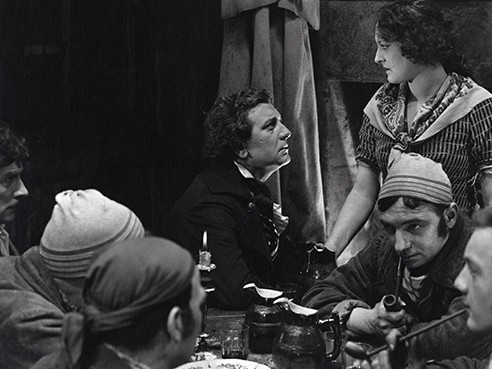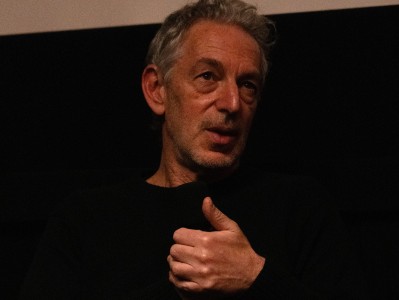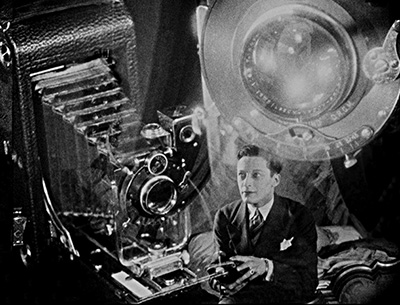
The Red Inn introduction by David Pendleton and film historian Sarah Keller.
Transcript
John Quackenbush 0:00
March 5, 2016. The Harvard Film Archive screened The Red Inn. This is the recording of the introduction by HFA Programmer David Pendleton and film historian Sarah Keller.
David Pendleton 0:15
By the time he died, Epstein's reputation was in eclipse. He died in the 1950s. But slowly but surely—starting from Langlois, working its way out—he's been slowly but surely being rediscovered around the world. And one of the main people behind that is Professor Sarah Keller, who teaches at the University of Massachusetts at Boston, who's one of the leading Epstein scholars, the co-editor of a great anthology called Jean Epstein, that is half Jean Epstein's writings on cinema—because he was actually a remarkable and poetic and insightful writer on cinema, as well as a filmmaker—and then half essays by contemporary scholars about Epstein's work. It's worth checking out. One of the few books in English on Epstein, but also one of the really important ones. And so here to say a few words about The Red Inn, without further ado, please welcome Sarah Keller.
[APPLAUSE]
Sarah Keller 1:20
Thank you, David. And thank you again for the opportunity to come and say a couple of words about this film, and also to be able to see it screened, which is really such a gift and a treat. When I started my research about Epstein, you had to basically go to Paris to try to see the films, and sometimes they would tell you which films they had, and sometimes they wouldn't. So you had to kind of create a paper trail of other people who had seen the films in certain places so that you could say, “I know that this film is here, is there a chance that I could see it?” And then usually on a lightboard, rather than actually projected. So it is, again, just a real gift to see it in a large-screen format.
So the other thing that I should say, following David's comments, is that in 2007 or so—which is when I was starting to do the research for this book—the Cinémathèque Française had only started to restore Finis Terrae. And most of the other titles were in the process. So it's really been in the last decade or so that all of these films that you're seeing in this fantastic series have been restored. So the moment for Epstein is really now, and you're very lucky to be part of it, I think. And I'm glad that you're here to see this film.
So just a couple of things about this film. Also as David said, this is Epstein's first fictional feature film. Before this, we have Pasteur, which is a documentary about the centenary of Louis Pasteur. Epstein trained in medicine, so he was sort of an ideal filmmaker for that first film. But he turned to Balzac’s novel, The Red Inn, for his source material for this first fiction film, in part because Epstein really began his career in aesthetics as a literary critic, so starting in about 1920 and through 1923, he wrote two books that were primarily about literature. So he was really invested in literature, and in particular, poetry. But he was also definitely interested in fiction. We know this, not only because he was writing about some of it, but because he was writing his own novels. During this period, he published serially a few novels. Only one novel that he wrote actually became source material for one of his own films. And that's L’Or des mers, which has also been part of the series. Gold from the Seas. The other novels tend to be a little bit more incomplete, I would say, but vastly interesting. And there is a project in France right now to bring all of that material back to light. So a lot of it has really disappeared. It will be in French, but they're publishing many volumes of all of Epstein's published, unpublished, and hidden works from his entire life. It's a major project and very exciting.
So he was clearly invested in literature. And this particular story is interesting. (You can also read the story easily because it's part of the Gutenberg Project, so it's available readily online, if you're interested in reading the source material for The Red Inn.) But it's a story within a story. It has a moment at which, well, several moments at which the frame and the interior of the frame overlap, which seems to be a good metaphor for what it is that Epstein is interested in in this whole project. A sort of sense of how the story is being told, and then the story itself, and immersing you within that story. So he's interested on both of those levels of engaging his audience. Laurent Guido writes about Jean Epstein's search for, quote, “a filmic equivalent of the dreamlike allure which corresponds to the peculiar psychological rhythm,” that's Epstein's words, “of Balzac’s novel.” So he's interested in trying to find a way to cinematically represent a kind of rhythm in Balzac’s prose, even. And to do that, for this film, he measured out the number of shots, as well as the number of frames per shot, for a great deal of this film. Not all of it, but several sequences correspond to this sort of meticulous desire to make things rhythmical. So you might attend to that. He's interested in sort of finding metrical patterns in the novel, as well as in the cinematic exploration of it.
I'm going to just say one other thing, because I don't want to talk too long; I want you to actually witness it. To this rhythmic end, he uses some slight and almost indiscernible slow motion. He uses a lot more of it in the films that follow this. I think he felt a little bit insecure about what that would actually mean for telling the story. But you'll notice there's a little bit of slight slow-motion. Also, Balzac’s story is extremely complicated. It has flashbacks, flash forwards, and characters who are hidden in one part that reappear in another part. Here, it's a little bit less easy to hide the identity of a character when you can actually see them visually. So there are interesting ways that Epstein manages that, which I might also just call your attention to thinking about, how he hides certain narrative information in plain sight.
And then I just want to very quickly read something that comes from this time period that Epstein wrote, where he's thinking about the intersection of literature and the cinema, which is what he believed The Red Inn was really trying to do, sort of marry the two, literature and cinema. So this is Epstein writing in 1921, just a year before he started to make this film: “Cinema saturates modern literature. And inversely, this mysterious art is imbued with a great amount of literature. It is true that, to date, the cine-literary collaboration has mostly produced filmic adaptations, films which would be impossible to criticize too harshly, and which have led astray this emerging, still hesitant mode of expression,” meaning the cinema, “that nonetheless stands as the most subtle one we have ever known, the most attuned to the moment. If viewing a second-rate film made by a mindless director who only knows about literature from the French Academy and its cohorts, makes us think of modern literature in spite of him, or rather without his being aware of it, that's because there exists a natural interplay between this new form of literature, modern literature, and cinema that functions on several levels. First of all, modern literature and cinema are equally enemies of the theater. Any attempt to reconcile them is pointless. Like two different religions, two aesthetics cannot live side by side without coming into conflict. Under attack from both modern literature and cinema, theater, if not already at the point of death, will progressively grow weaker. It is a foregone conclusion. When even a good stage actor has to struggle just to exist with the excessive verbiage of a forty-line monologue in verse so regular as to ring false, how can theatre hope to compete with the screen, where every fibril of movement is visible, and where I'm delighted to see a man who does not need to act, because simply human, most beautiful animal on earth, he walks, runs, comes to a halt, and sometimes turns his face to the voracious audience. Cinema and the new approach to literature need to support each other by superimposing their aesthetics.” And that's exactly what Epstein aims to do in this film. I hope you'll enjoy it very much. Thanks.
[APPLAUSE]
© Harvard Film Archive
Related film series
Explore more conversations
Jay Sakomoto

Martín Rejtman & Carlos Gutiérrez



